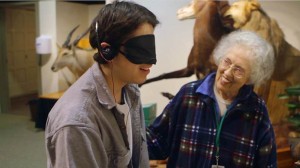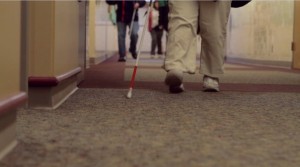Podcast: Download (Duration: 8:18 — 11.4MB)

The concert benefits Pacific Foundation for Blind Children and School of Piano Technology for the Blind.
The Washington State School for the Blind in Vancouver recently celebrated 125 years of providing instruction for the state’s visually impaired.
People have this concept of magnet schools – that’s really all we are,” says Dr. Dean O. Stenehjem, the superintendent. “We’re a magnet school specializing in training on blindness and visual impairment.”
Stenehjem’s approach begins with reversing isolation for the visually impaired and adding high expectations for independence and employment success in the sighted community. He delivers a multitude of programs and partnerships to underwrite the school’s long and short-term strategies.
A relatively new addition to the blind school is “Sensory Safari,” a museum of natural history that is introduced by a wildlife mural created by former student Nov Gnik. The museum contributes to the educational experience by offering an innovative way to bring animals from deep in the wild to arm’s length. The museum features full bodied, taxidermied wild animals and mounted heads, and students are encouraged to take a full-on approach. Hands glide over each beast and the visually impaired student learns what a lion is by exploring it from tail to crown and from canine teeth to claws.
Sensory Safari is an outgrowth of a partnership with the Northwest Chapter of Safari Club International, and was originally conceived by Stenehjem and Olympia-area judge Bill Harrison. Harrison organized one-day campus events that eventually blossomed into housing the exhibits full-time at the school. Today, the Safari Club organizes and manages the exhibit, and brought in the U.S. Fish and Wildlife Service to help. Volunteers repair, fix or replace exhibits and clean the well-loved displays two to three times a year with contributions valued at “well over a quarter of a million dollars,” says Stenehjem.
In alignment with Stenehjem’s core values of making students part of community, they’re trained to be docents. They give tours and help visitors access the audio and Braille descriptions of the exhibits.
Eventually, Stenehjem would like to be able to have the museum open on a regular basis, but “part of it is just having enough people to make this possible.”
In the meantime, the payoff for Stenehjem is the reaction of those able to participate. A lucky few from the sighted population are invited to put a blindfold on and explore.
“Not having their sight scares the heck out of them,” says Stenehjem.
On the other hand, blind students have an entirely different experience.
“You get the biggest grin you’ve ever seen.”
CREDITS
Video shot and edited by Jordan Thompson
The Washington State School for the blind serves more than 600 visually impaired youth ranging in age from birth to 21. The facility is a statewide demonstration and resource center that provides direct and indirect services to students both on campus and around the state.
Washington State School for the Blind
2214 E 13th St.
Vancouver WA 98661
360-696-6321











